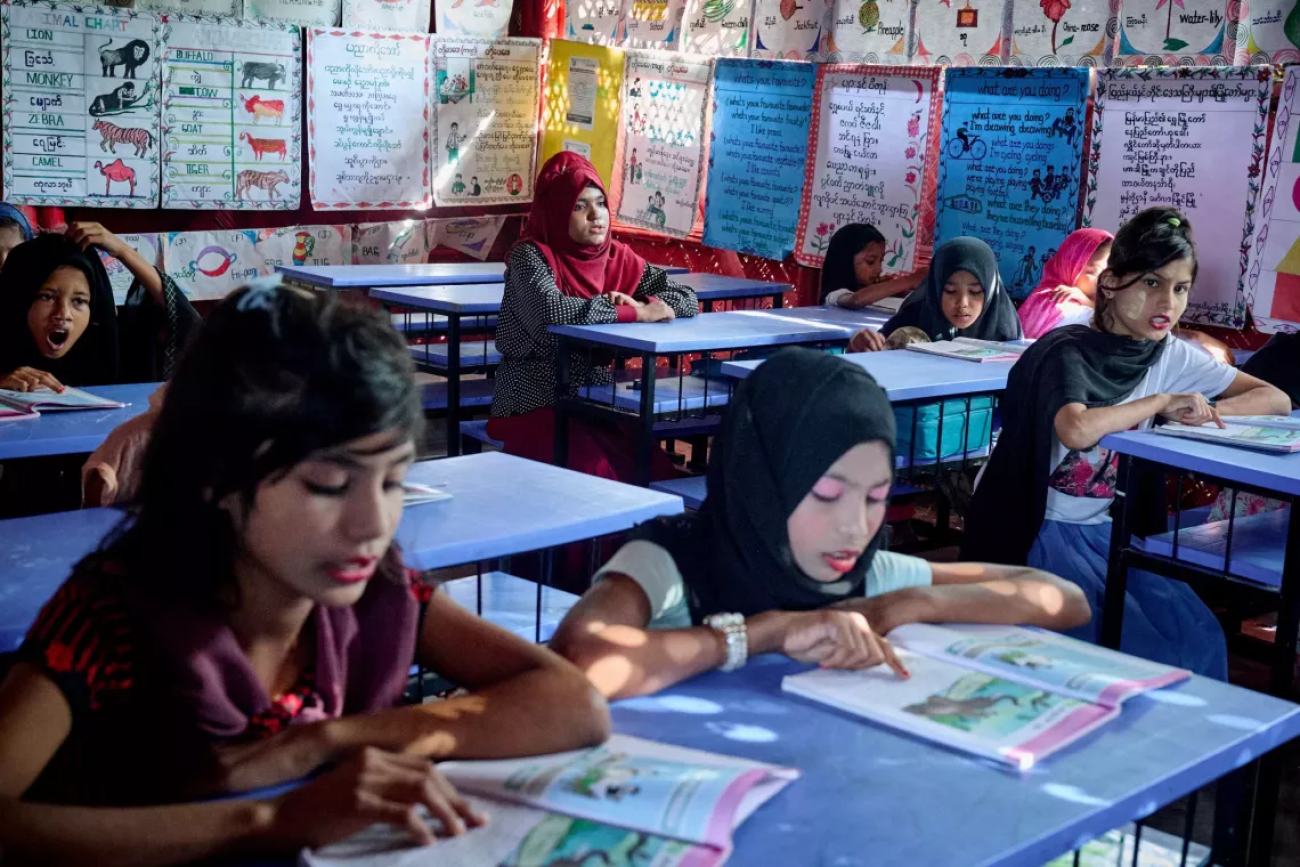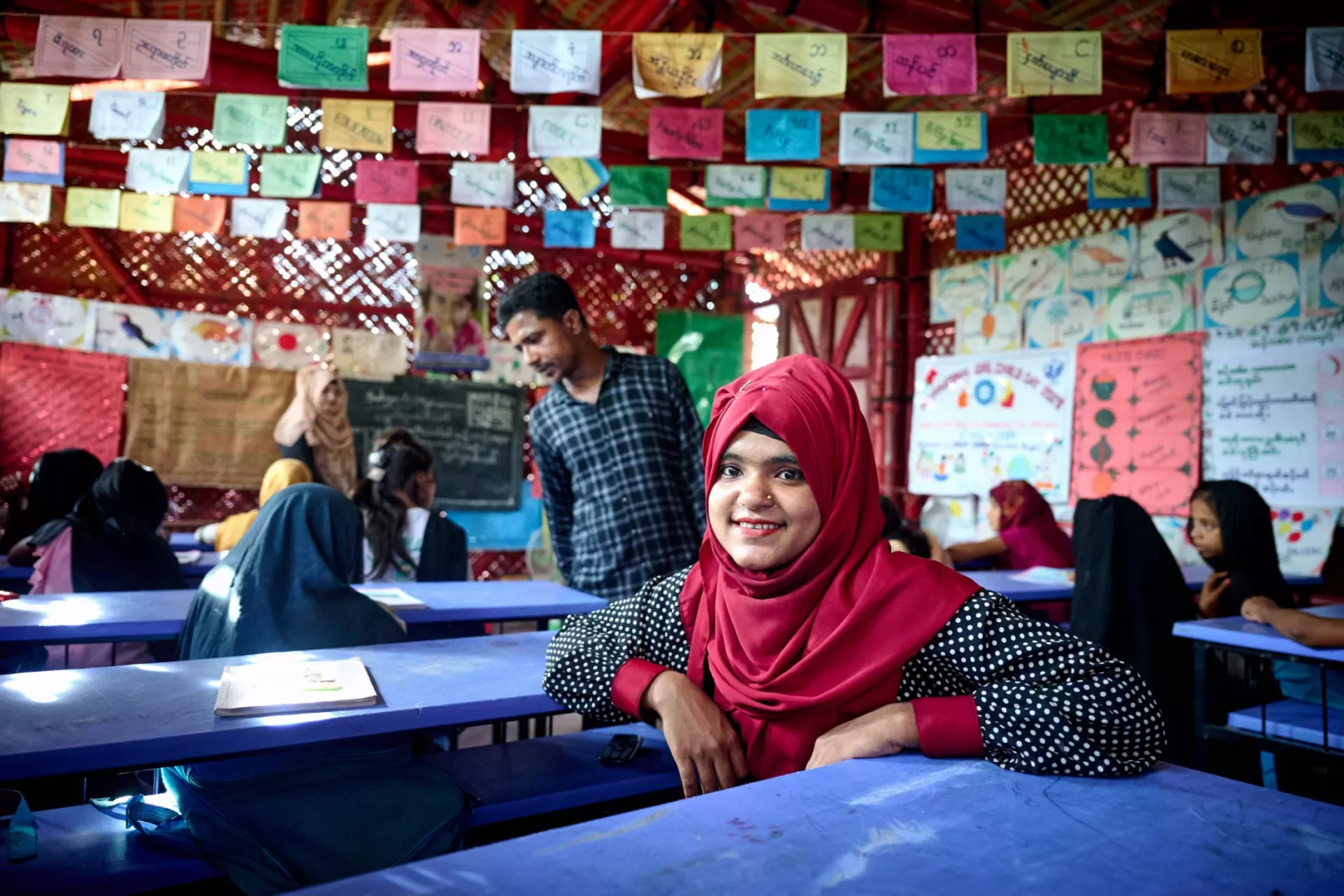Volunteering for Girls’ Education in the Rohingya Camps

Female Rohingya volunteers help remove the barriers that keep adolescent girls from learning.
30 September 2024
“In Myanmar, I studied until class 3. I liked going to school there; I had many friends,” says 20-year-old Rahima, remembering her childhood as a student.
Rahima’s educational journey faced an abrupt halt when she fled her home in 2017 and reached the refugee camps in Bangladesh. Forbidden to go outside alone after reaching puberty, she was soon married off by her parents.
"I did not have the chance to continue my studies since my period started, and I could not tell my husband that I wanted to continue studying," she explains.
Her marriage at 18 years old brought its own set of challenges. Within a year of marriage, her husband took another wife, leaving Rahima emotionally shattered.
In the Rohingya refugee camps, adolescent girls face many significant barriers to their learning. Reluctance from parents to send their adolescent daughters to class once they reach puberty, as well as harassment on the streets and the distance between homes and learning facilities are cited as reasons for girls not attending classes.
A Renewed Purpose

While living with her mother, Rahima felt restless as she spent most of her days at home. Her life reached a turning point when she learned about a volunteer position supporting girls at a nearby learning centre.
To make education more inclusive in the Rohingya camps, UNICEF and its partners began providing separate lessons for adolescent girls in all-female classrooms in 2022 at the request of girls and community members. As part of these efforts, UNICEF recruited female Rohingya volunteers to escort girls to and from learning facilities to ensure their safety. They remain with girls in class and follow-up with girls whose attendance fluctuates and with families who are not sending their daughters to school.
Soon after applying for the role, Rahima became a volunteer at the learning centre, which has brought her a renewed sense of purpose. She admits that it initially took her some time to adjust to her new responsibilities.
"When I began working as a volunteer, I would often get lost,” Rahima explains. “The camp can be confusing, but the aid workers and teachers helped me identify the girls' homes. Now, I have the routes memorized.”
“I need to accompany young girls to the learning centre because there are men who may disturb them or tease them on the streets," she adds, shedding light on safety concerns that persist in the camp. Rahima’s presence serves as a protective shield against harassment in a challenging environment, allowing the girls and their parents to feel secure.
Rahima’s role also extends beyond walking with the girls to the learning centre. As an advocate for girls’ education in the camps, she helps promote education in the Rohingya community and serves as a role model for female students. It is a responsibility that she takes seriously based on her own experiences.
"I tell parents to send their daughters to school,” Rahima shares. “I inform the parents about how education can help the girls in their day-to-day lives."
Her dedication extends to her own pursuit of knowledge. While sitting with the girls in class, Rahima seizes on the opportunity to continue her own education, learning Burmese and other subjects that are taught as part of the Myanmar Curriculum.
Thanks to female Rohingya volunteers like Rahima and the introduction of girls-only classes, parents have been more willing to send their daughters to learning centres. In the 2023-24 academic year, there was a seven per cent increase in the number of girls attending secondary education classes from 17 per cent to 24 per cent. As parents in the Rohingya community feel more confident sending their adolescent girls to learning facilities, the number of female Rohingya volunteers has increased from 71 to 305.
Rahima envisions a brighter future for herself and the adolescent girls she accompanies. Her journey from dropping out of school to becoming an advocate for girls’ education in the camps underscores the profound impact that one individual can have on a community.
"The girls are like my little sisters,” Rahima explains. “We have become friends over time, and they share everything with me. I want them to get an education so that they can become responsible adults and make something out of themselves.”
UNICEF wishes to express gratitude to the European Union for their contributions and continued support for girls’ education in the Rohingya refugee camps in Bangladesh.











